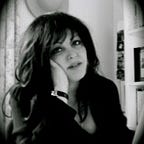Pencarreg
I don’t think I shall easily forget that afternoon at the top of Pencarreg. Morina and I travelled up a long hedge-rowed, one-lane, rural road that I had never seen before (but she had always known was there) with an incremental sense of enclosure – as it drew in, closed in, shut out whatever was behind us, like a wormhole in a galaxy far far away. The deeper we went into the land, the more unreal seemed even the memory of the rest of the world. Even Llambed, geographically a part of this same land, faded away. The parts of me that belong to Llambed also faded away – and what remained, very strangely, was my own past — not just Morina’s.
Whatever was peeled away in that microcosmic journey left me myself, the essential person, approaching the age of reason – at five, at six, not yet corrupted by thought. And so, able to see the fairies and imps in the hawthorne, the history in the plum. Able too, to pick up the scent of Druidry, green and smoky, in the air around the oaks along the way. There may have been mistletoe. There was certainly a golden flash of sickle.
When the parish road ended and the earth and pebble track began, the sheep fled in terror at our approach. This flock from another century, isolated by time and contained only by hedge and cattle-grate, fenceless, defenceless — seemed never to have seen a car before. Indeed the car seemed to me out of place and just as I began to think of it as such, it turned into a pumpkin, so to speak – the engine grew quieter and we may have been in a carriage for all I could tell. Or a cloud.
The moss on the trees may have muffled the sound or the wild rush of the brook drowned it out. But I heard songbirds. Or birdsong. Invisible chatter and whispers. Revels in the wood. Saw the red kites flying three feet off the ground, like predatory butterflies. Or maybe that was later, on the way back. Everything is one, in Wales. Even time. Everything happens but sequence is irrelevant.
As we rounded the next curve, the track became a footpath and the car became a living thing – a sure-footed prehistoric animal lumbering peacefully toward its den. And there we stopped at the end of an endless lane in a hollow on a plateau at the top of the world – where before us like a land of dreams was all the world — all of Wales, it seemed — in green so radiant that it would (like the Emerald City of Oz) hurt your eyes were it not mercifully misted with the remnants of clouds.
All the way to the purple-mountained distance we could see myriad miniature worlds of fields and farms and families – an ancient history rippling before us in each brilliant blade of grass. In front of us, framing this vista, was a garden filled with foxgloves and roses, lilies and phlox and hundreds of other flowers of every colour, shape and size — climbing, dancing waving growing, profuse and celebratory of the soil in which they stood — where Morina stood, danced, grew and waved goodbye so long ago.
To the left was a house. The house. And a mossy path to a more hidden garden, and one beyond that – a sequence of secrets – leading to a steep sharp valley, guarding a silver river where once a child and dryad swam and played. To the right of the house, stood an old, vine-covered stone barn filled – filled, as it mysteriously turned out, with pianos. Rooms and rooms of pianos: shining, glorious instruments in shades of mahogany, black, caramel, tan, dark, dark walnut, golden oak and sand.
And out came a Welshman, in an orange jumper, called “John-the-Piano’ — because he makes them — who thought we were someone else, shadowed by a sheepdog named Sally, who knew we weren’t, but rather part of what was and had been and would be and who should be there at that time – and before and tomorrow. This is the place where Morina was made.
Not one false note. Even the pianos were in tune.
___________________
~Harrison Solow, 2006
